Japan safety guide
Japan has always been a treasured tourist destination for Singaporeans to get their much-needed holiday getaway, exploring snow-capped cities or sun-kissed beaches. While the country is known for being very safe for tourists, some visitors may have underlying fears of natural disasters that occur relatively frequently.
But, don’t worry, there are tons of measures you can take, like downloading apps, to help you navigate any scenarios should you need to. To enjoy your next trip to Japan and savour your much-deserved vacay, here’s a guide to travelling in Japan safely.
Table of Contents
- Japan safety guide
- Is Japan safe?
- What to do in the event of a natural disaster in Japan?
- – Apps to download before flying –
- 1. NERV Disaster Prevention App
- 2. Safety Tips
- 3. NHK World App
- 4. Disaster Preparedness Tokyo
- – General preparation –
- 5. Know your emergency contacts
- 6. Prepare an emergency kit
- 7. Travel Insurance
- Take safety precautions with this Japan safety guide
Is Japan safe?
Japan is considered safe in terms of crime rate, having been ranked the ninth-safest country in the world for 2023, according to the World Population Review. To give you some context, this ranking is done using The Global Peace Index (GPI) which ranks the safest and most peaceful countries in the world using indicators like external violent conflicts, political instability, potential for terrorist acts, and number of homicides.
Speaking from an environmental pov, Japan is quite prone to natural disasters due to its geographical location – along the Ring of Fire, where several tectonic plates meet. A few of the disasters that could potentially occur include earthquakes, tsunamis, volcanic eruptions, and typhoons. For example, the Nankai Trough megaquake raised a few alarm bells even for tourists.
However, because of the frequency of occurrence, most of these are mild and can be foreseen through the government’s technology. This means they are generally well prepared and can keep you informed of the next best steps as well as give you ample time to prepare.
What to do in the event of a natural disaster in Japan?
First and foremost, it would be useful to be aware of the different alarm sounds that may go off in Japan in the event of a natural disaster.
P.S. Don’t play this video out loud in Japan, lest you accidentally trigger a false alarm and people around you start panicking.
Earthquakes
Japan Meteorological Agency (JMA) provides advance warnings of earthquakes, including information about arrival times and intensities. This is done through a seismic intensity scale, which measures the intensity of shaking from 0 (no felt shaking) to 7 (extreme shaking).
JMA considers earthquakes of Intensity 4 and above as events that warrant concern. Though there isn’t any serious damage, you should still stay alert in the event of a potential followed earthquake that is stronger.
There will also be an alarm that will be broadcast on electrical appliances, including your TV, radio, cell phones, and smartphones as long as you’ve got an active cellular connection.
Instead of finding shelter in your partner’s arms, make the wiser choice of finding shelter in one of Japan’s many earthquake-resistant structures. In fact for all disasters, there are Designated Evacuation Shelters, like schools and community centres. These are facilities where you can stay in until there is no more risk of disaster damage.
Remember, it’s always best to stay indoors and find cover under anything sturdy, like a table, and hold on to it for safety.
Tsunami
JMA deserves the title of being your reliable bestie, since it once again proves itself useful for keeping you safe in the event of a tsunami. To give you ample time to prepare, warnings of tsunamis will be provided approximately 3 minutes after an earthquake.
Once you’ve taken the warning into account, immediately move inland and to higher ground. Avoid the beach and water bodies at all costs.
Typhoon
In cases of typhoons, it’s important to stay informed by tuning into the local news, like NHK World and CNN Japan. Or you can also listen to radio stations, like InterFM for weather updates and official advice in English.
It’s also best to stay indoors and stay away from windows, in cases of shattered glass or debris.
Volcano eruptions
As always, warnings will be provided by our favourite agency, JMA, so that you can evacuate early. It’s also best to avoid areas downwind, and river valleys downstream of the volcano.
Aim to take shelter from the volcanic ash and rubble, since you most definitely aren’t a character from Fireboy and Watergirl.
– Apps to download before flying –
1. NERV Disaster Prevention App
Quick emergency warnings
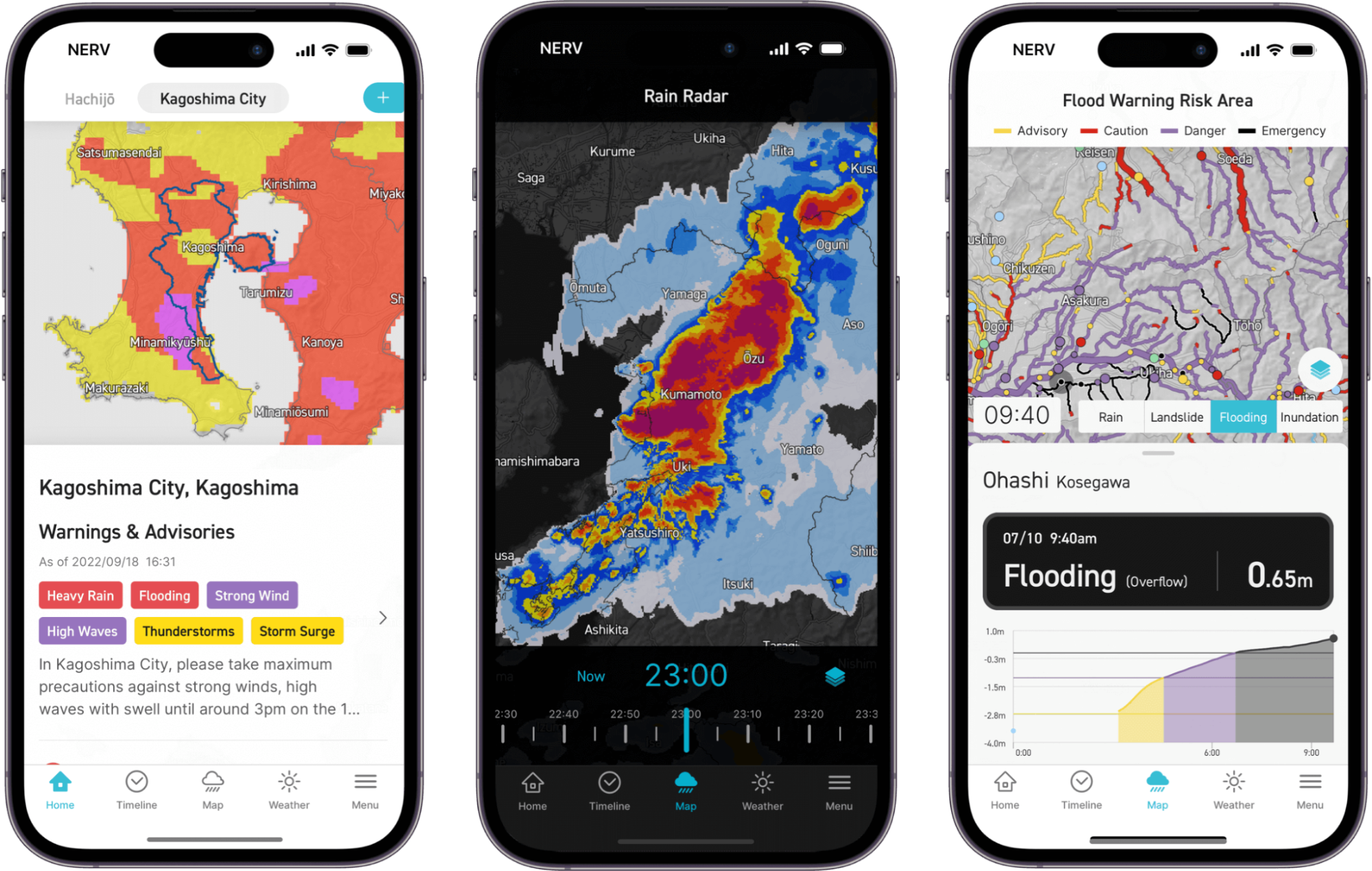 Image credit: nerv.app
Image credit: nerv.app
Inspired by the anime, Neon Genesis Evangelion, Nerv Disaster Prevention App helps its users by delivering earthquake, tsunami, volcanic eruption, and emergency warnings. It is also optimised based on the user’s current and registered locations, so you don’t have to waste precious time worrying about the accuracy of the information provided.
In addition to convenience, this useful app will also help provide weather-related disaster prevention information for flooding and landslides. It’s also best to plan your trip beforehand based on the weather and what activities you plan on doing.
Download the NERV Disaster Prevention App (App Store | Google Play).
2. Safety Tips
Weather warnings
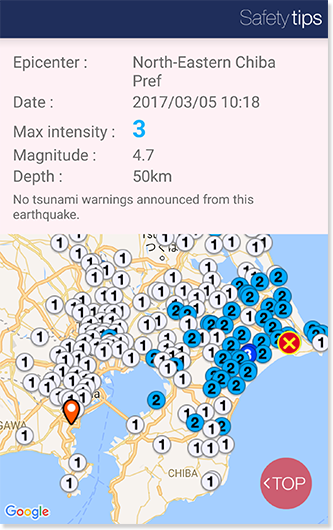
Image credit: Safety Tips via Google Play
Safety Tips will help its users get a kickstart to safety by pushing alerts about earthquake early warnings, tsunami warnings, and other weather warnings within Japan. It also provides an evacuation flow chart explaining actions to be followed, taking into account your circumstances.
Other handy highlights include providing helpful phrases for obtaining information from people around and website links that contain helpful information in the event of a disaster.
If Japanese isn’t your strong suit, don’t worry, there is a wide variety of languages to pick from for you to comfortably use the app – English, Japanese, Hangul, Traditional Chinese, Simplified Chinese, Vietnamese, Spanish, Portuguese, Thai, Indonesian, Tagalog, Nepali, Khmer, Burmese, and Mongolian.
Download the Safety Tips App (App Store | Google Play).
3. NHK World App
Latest news on Japan’s happenings
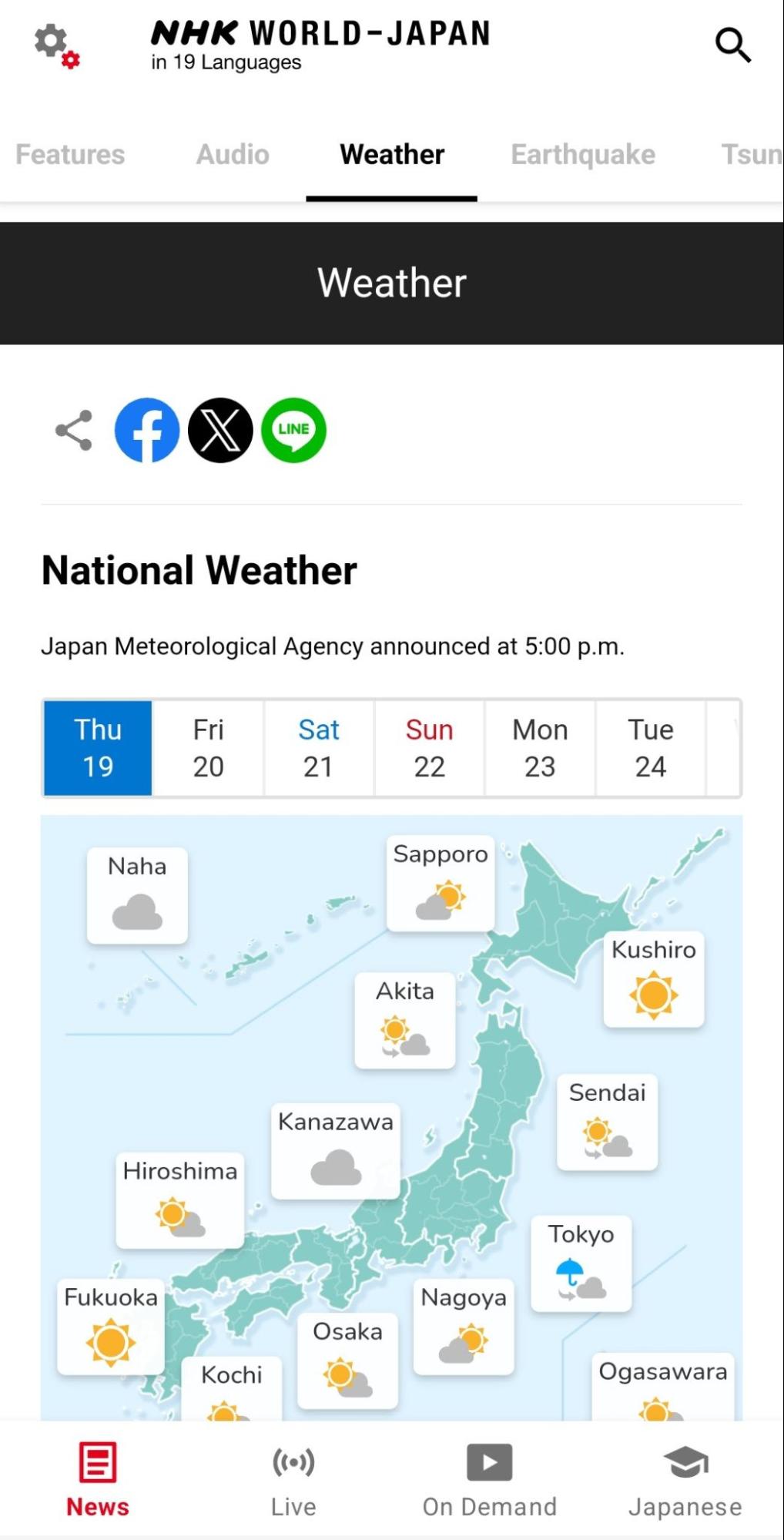
Image credit: NHK World App
The Ministry of Foreign Affairs Singapore has a list of advised steps to take to equip you for natural disasters.
One of them is the NHK World App, a useful app that is guaranteed to provide you with relevant information in times of need. Serving as an international extension of Japan’s public media organisation NHK, it provides live updates of occurrences. To make your browsing experience easier, there are separate sections for weather, earthquakes, and tsunamis.
Download the NHK World App (App Store | Google Play).
4. Disaster Preparedness Tokyo
Particularly useful in Tokyo
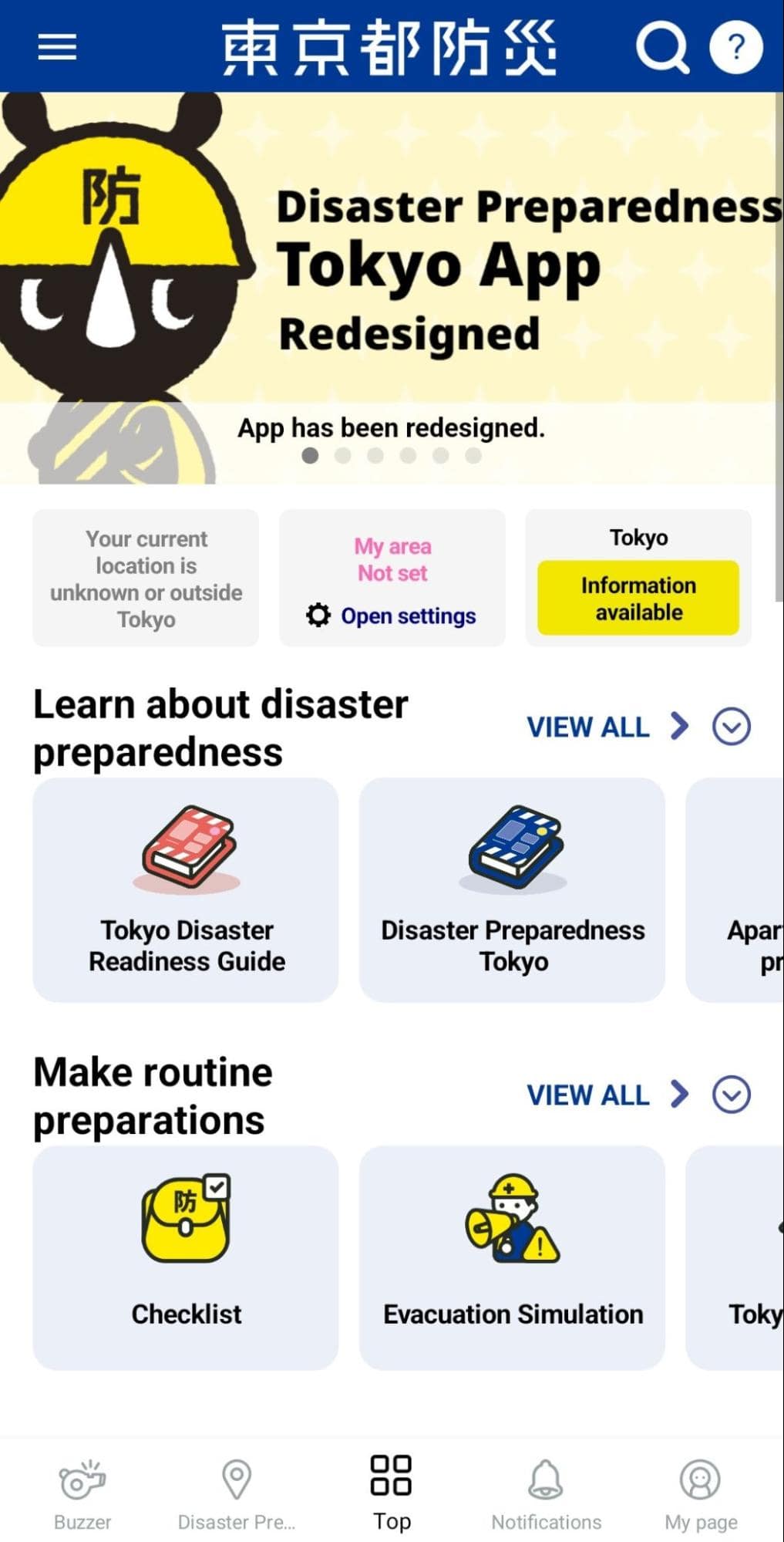
Image credit: Disaster Preparedness Tokyo App
Though its features are only tailored to Tokyo, Disaster Preparedness Tokyo still provides tons of handy information that will help save your much-needed time and energy.
To help you navigate the city, it includes flood damage risk maps and area danger level maps that provide danger levels for selected locations. You can also educate yourself with the “Disaster Readiness Guide” and “Disaster Preparedness Tokyo” booklets to properly equip you with the knowledge and information you will need in times of calamities.
For you forgetful folks, don’t worry, there is also a checklist for different scenarios, including indoor preparations, items to prepare, and food to stockpile.
You can also check routes to destinations from specified locations, like your hotel or the airport.
Download the Disaster Preparedness Tokyo App (App Store | Google Play).
– General preparation –
5. Know your emergency contacts
Police & Fire Department numbers

For you to be totally zen on your much-needed vacay, take note of these emergency contacts that will help you in times of need:
- Fire Department or Ambulance Services: In general, in cases of emergency, dial 119 to be connected to either the fire department or staff responsible for sending an ambulance to your location.
- Police: Dial 110 to access police help.
- Tokyo’s English Helpline: Dial 03-3501-0110 for Tokyo’s Metropolitan Police English Helpline, available 24/7.
- Mental Health Support: Dial 03-5774-0992 to receive effective support and counselling services in English. Do note these services are available from Mon-Thu (9am-11pm) and Fri-Sun (9am-2am).
- If you’re a tourist, it would be ideal to keep your embassy’s information saved on your phone for speedy communication.
Singaporeans can visit the Embassy of Singapore in Tokyo or Consulates-General in Osaka or Nagoya for services, like emergency travel documents and evacuation assistance.
Pro tip: Singaporeans travelling and living in Japan can eRegister with MFA so that they can be contacted in the event of an emergency.
6. Prepare an emergency kit
Recommended items to help out in times of need
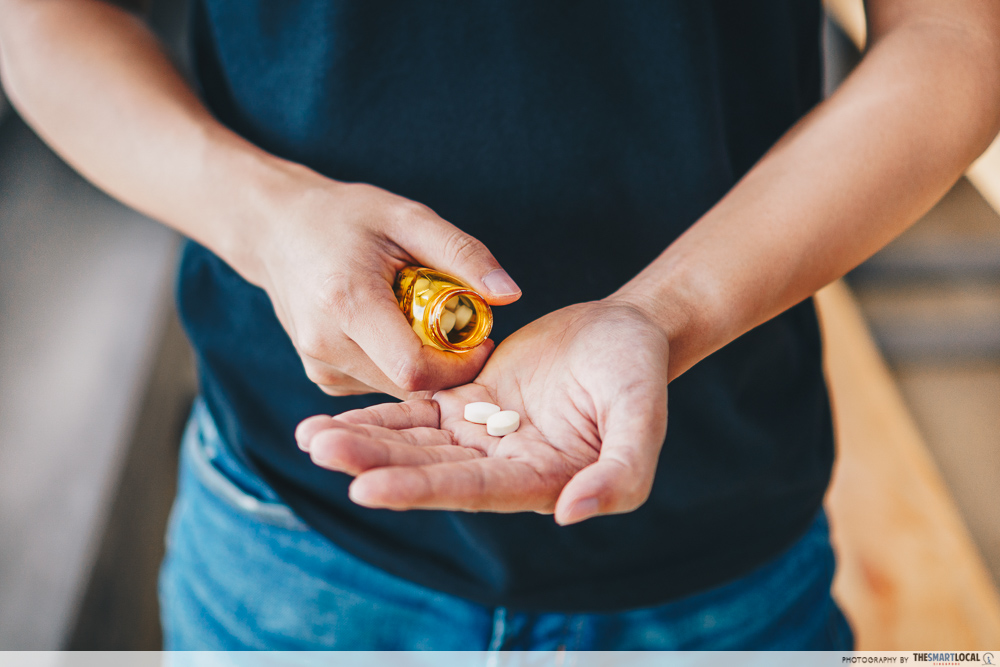
As we all know, time is precious in cases of calamity. Instead of stressing over packing your essentials, it’s best to prepare an emergency kit beforehand to make your process far smoother. Some things to consider keeping in your kit are a flashlight, blanket, batteries, prescription medicine if you have any, food and water, and a first-aid kit.
Save space and avoid overpacking with non-essential items, like the skincare products you swear you need. Just get the best of beauty products in Japan instead.
7. Travel Insurance
Cover your financial risks

For those of you who claim you’d rather lose a limb than money, we strongly suggest you think twice. Nevertheless, it’s always a good idea to get a travel insurance plan that includes medical costs coverage. In fact, some travel insurances, like Etiqa and Directasia, cover costs of natural disaster-caused injuries for both overseas and Singapore expenses.
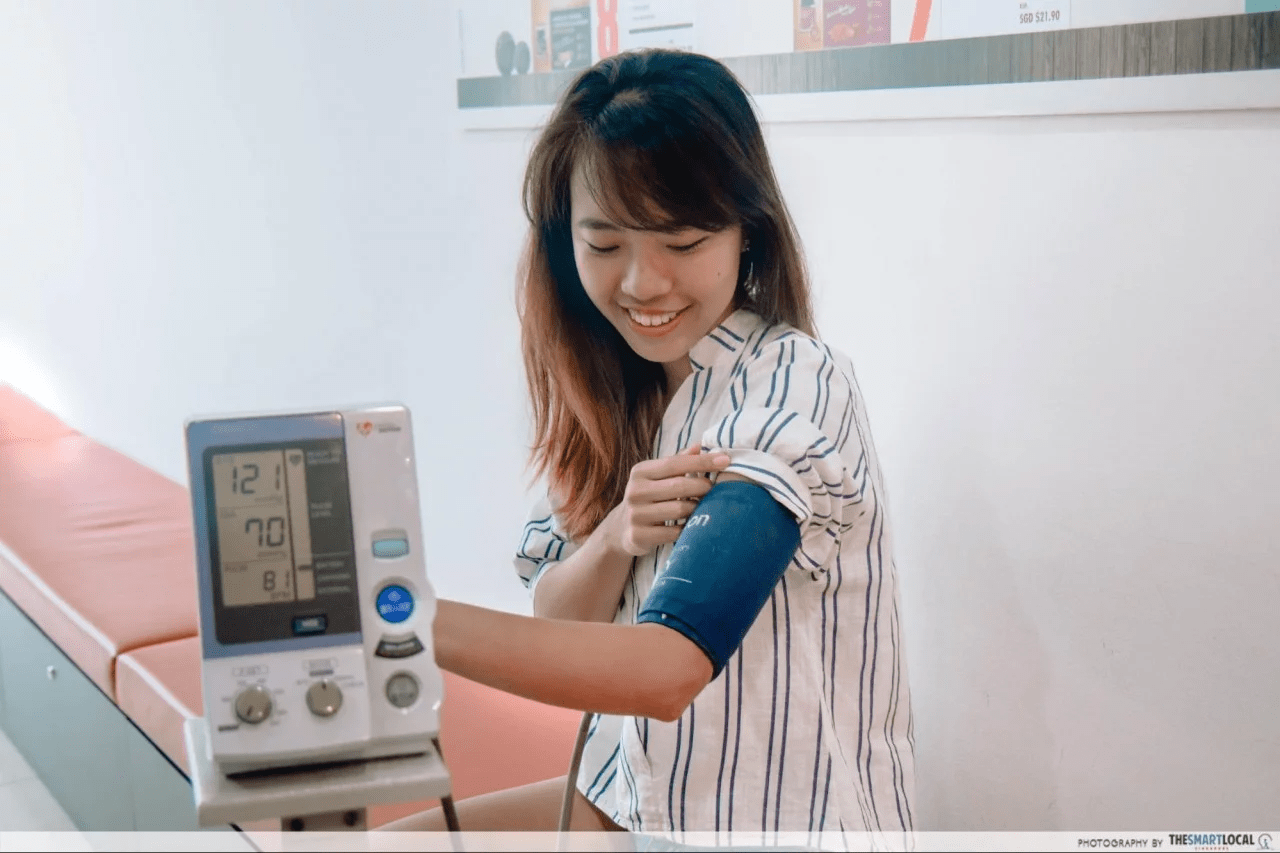
Do note that covering injuries and overseas hospitalisation generally depends on which type of insurance plan you have – tier, basic, or premium.
If being on time isn’t your forté, consider getting insurance that covers trip cancellation, flight delay, damage or loss of baggage, and missed flights – assuming you meet the policy’s qualification criteria.
Take safety precautions with this Japan safety guide
Though Shawn Mendes’ song Lost in Japan is definitely a bop, we hope you know it isn’t meant to be taken literally. That being said, even if your friends make fun of you for your emergency kits, remind them it’s always better to be safe than sorry.
Nevertheless, to fully enjoy your holiday in this beloved city, prepare yourself for any cases of emergency and bookmark this Japan safety guide.
For more on Japan, check out:
Originally published on 1st October 2024. Last updated on 4th April 2025.
